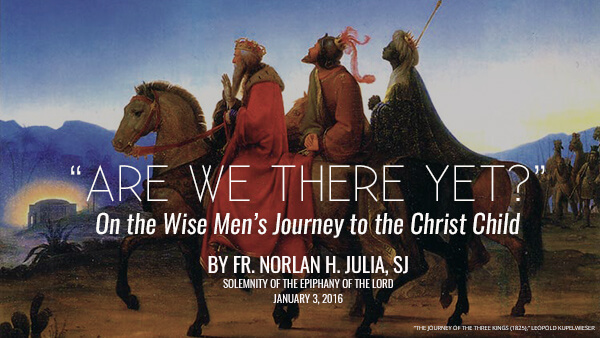


Fr. Norlan H. Julia, SJ
Solemnity of the Epiphany of the Lord
January 3, 2016
“Do you know where you’re going to? Do you like the things that life is showing you? Where are you going to? … Do you get what you’re hoping for? When you look behind you there’s no open door; What are you hoping for? Do you know?”
The feast of the Epiphany (or manifestation) of the Lord is fittingly celebrated at the beginning of the New Year, for it invites us to ask some key questions as the New Year begins. Questions which sound so familiar. Questions the wise men must have been pondering as they examined the movements of the star, and tried to figure out whether the promised Messiah has come. And if he has come, where is he to be found? These are our questions too, we who live two thousand years apart from the wise men. As heirs to the same promise, we share the same hopes and dreams. We tread the same road and walk the same path, in search of Him who is the promised Messiah.
The feast of the Epiphany marks another high point in the season of Christmas. It continues the theme of fulfilment-promise which runs through the infancy narratives of both Matthew and Luke. In Christ, the promises of ancient times are fulfilled: of a Messiah that will set God’s people free, of a King who will rule with justice and constancy, of God Himself dwelling among His people, of Gentiles also recognizing God’s salvation through Israel. These themes are evident in all the Scripture readings from this feast: from the prophet Isaiah, the responsorial psalm, from St. Paul, and from St. Matthew’s gospel. But the long journey from the promise to the fulfilment is one that strikes many a believer from among the many themes for reflection in today’s feast.
Benedict XVI says that the wise men “represent the journeying of humanity toward Christ. They initiate a procession that continues throughout history. Not only do they represent the people who have found the way to Christ; they represent the inner aspiration of the human spirit, the dynamism of religions and human reason toward him.” Hence, in a sense, the wise men have not yet arrived. In you and me who are torn between fleeting wants and lasting desires, in creation who continues to groan as it awaits redemption, and in a merciful God who never tires searching for the lost, the wise men are still journeying towards the Christ Child.
Yet, in true sense, the wise men have arrived. We have arrived. Together with them we say, “We have seen his star rise in the East, and we have come to adore him” (Mt.2.2). Christ is born. He is here, Emmanuel, God-with-us. We acclaim Him as we do in every Eucharist, “Christ has died. Christ is risen. Christ will come again.” Again Benedict XVI reminds us of Paul’s teaching that “the risen Christ has conquered all the powers and forces in the heavens, and that he reigns over the entire universe… it is not the star that determines the child’s destiny, it is the child that directs the star.”
As the New Year begins, we confidently and courageously continue our personal and communal journey, saying to ourselves and to the world, “I know where I’m going to. I know what am I hoping for.” Not any star or any gold, but Christ, who is born, is risen, and is coming again.